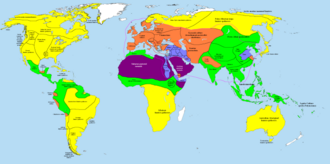
Back مجتمع من دون دولة Arabic Dövlətsiz cəmiyyət Azerbaijani Безьдзяржаўнае грамадзтва BE-X-OLD Bezstátní společnost Czech Ακρατική κοινωνία Greek Senŝtata socio Esperanto Sociedad sin Estado Spanish جامعه بیحکومت Persian Klaaniyhteiskunta Finnish Société sans État French

| Part of the Politics series |
| Basic forms of government |
|---|
| List of countries by system of government |
|
|
| Part of a series on |
| Anarchism |
|---|
 |
| Part of a series on |
| Libertarianism |
|---|
A stateless society is a society that is not governed by a state.[1] In stateless societies, there is little concentration of authority; most positions of authority that do exist are very limited in power and are generally not permanently-held positions; and social bodies that resolve disputes through predefined rules tend to be small.[2] Different stateless societies feature highly variable economic systems and cultural practices.[3]
While stateless societies were the norm in human prehistory, few stateless societies exist today; almost the entire global population resides within the jurisdiction of a sovereign state, though in some regions nominal state authorities may be very weak and may wield little or no actual power. Over the course of history most stateless peoples have become integrated into external state-based societies.[4][need quotation to verify]
Some political philosophies, particularly anarchism, regard the state as an unwelcome institution and stateless societies as the ideal, while Marxism considers that in a post-capitalist society, the state would become unnecessary and would wither away.
- ^ Cite error: The named reference
Routledgewas invoked but never defined (see the help page). - ^ Ellis, Stephen (2001). The Mask of Anarchy: The Destruction of Liberia and the Religious Dimension of an African Civil War. NYU Press. p. 198. ISBN 978-0-8147-2219-0 – via Google Books.
- ^ Béteille, André (2002). "Inequality and Equality". In Ingold, Tim (ed.). Companion Encyclopedia of Anthropology. Taylor & Francis. pp. 1042–1043. ISBN 978-0-415-28604-6 – via Google Books.
- ^ Faulks, Keith (2000). Political Sociology: A Critical Introduction. NYU Press. p. 23. ISBN 978-0-8147-2709-6 – via Google Books.